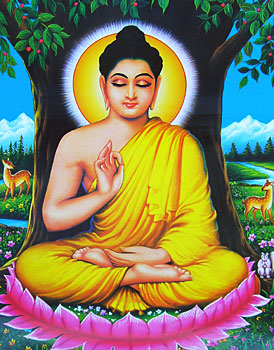 Sautrantika was an early school of Buddhist philosophy. They are believed to be descended from the Sthaviravada. Abhidharma texts of other early Buddhist schools were also not accepted by these schools. Sautrantika philosophy rejects the view of the Vaibhashikas that physical objects consisting of real basic ingredients are directly perceived. Reality consists of unique momentary particulars with a specific causal power. Particulars cause sensory impressions of which the mind forms images. This school feels that the variety of experience must have extra-mental causes although one is not directly acquainted with it. The direct objects of awareness are not physical objects but ideas having their own forms. There is no match between cause and representative content.
Sautrantika was an early school of Buddhist philosophy. They are believed to be descended from the Sthaviravada. Abhidharma texts of other early Buddhist schools were also not accepted by these schools. Sautrantika philosophy rejects the view of the Vaibhashikas that physical objects consisting of real basic ingredients are directly perceived. Reality consists of unique momentary particulars with a specific causal power. Particulars cause sensory impressions of which the mind forms images. This school feels that the variety of experience must have extra-mental causes although one is not directly acquainted with it. The direct objects of awareness are not physical objects but ideas having their own forms. There is no match between cause and representative content.
Sautrantikas object to the Vaibhashika tenet that physical objects are built up out of partless atoms. The Sautrantika differed from their parent school - the Sarvastivadins as far as ontology is concerned. The Sautrantika subscribed to a doctrine of "extreme momentariness" that believed that only the present moment existed. They used the concept of an asraya to explain the continuity of consciousness through rebirth.
The school is so called because of its reliance on the sutras, or on the words of Lord Buddha. There are two kinds of Sautrantikas: the Sautrantikas who follow scripture whose description of the two truths accords with that of the Vaibhashikas and the Sautrantikas following logic who take as their basis, Dharmakirti`s Seven Treatises on Logic.
This article is a stub. You can enrich by adding more information to it. Send your Write Up to content@indianetzone.com



















